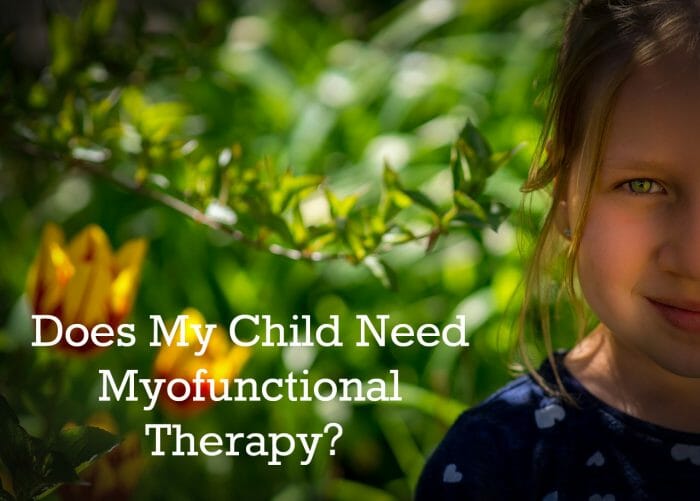Disorders of the muscles of the face and mouth in children can cause issues with breastfeeding, facial skeletal growth and development, chewing, swallowing, speech, breathing, sleep, dental alignment, oral hygiene, and even social interactions (due to open mouth breathing, drooling, and/or holding the tongue out of the mouth). Myofunctional therapy (also known as orofacial myology) uses exercises and behavior modification techniques to retrain the tongue, lips, and jaw with the aim of correcting functional irregularities of the face and mouth, including:
- Tongue thrust and swallowing
- Forward resting posture of the tongue
- Short upper lip
- Open-mouth resting posture
- Motor planning for speech sounds and swallowing
- Oral muscle movement for speech sounds
- Thumb/finger sucking
What is “tongue thrust?”
Tongue thrust is when the tongue is a prominent feature either when talking, swallowing, or eating. Imagine babies when they first begin to learn how to talk and eat solid food – they tend to stick out their tongues to push food out of their mouth, but as they develop this tendency subsides. Some children, however, continue to push their tongues forward which can lead to a number of problems. In addition to tongue thrust, the resting position of the tongue is very important, and sometimes missed on oral examinations. A forward resting position of the tongue tip against or between the teeth can result in dental changes over time. A tongue thrust and a forward resting position of the tongue often occur together.
Ask yourself the following questions when considering whether to have your child evaluated by a myofunctional therapist:
- Has your dentist or orthodontist mentioned that your child or teen might have a “tongue thrust?”
- Has your child been in speech therapy for some time with little gains toward increasing ability to make new sounds/words or increase intelligibility of speech?
- Does your child produce a lot of speech sounds with his or her tongue too far forward in his or her mouth?
- Does your child breathe with his or her mouth open, or have difficulty breathing through the nose due to allergies or enlarged tonsils/adenoids?
- Does your child’s tongue seem to move too far forward in his or her mouth when eating, especially swallowing?
If you answered yes to any of the above questions, your child may benefit from myofunctional therapy.
What are the goals for myofunctional therapy?
Therapists work with patients to cultivate an awareness of the muscles used for resting posture and swallowing and develop an individualized regular exercise and therapy program. The goal is to strengthen and rehabilitate the tongue and facial muscles while making the new neuromuscular patterns habitual. The myofunctional clinician uses specialized exercises to establish correct functional activities of the tongue, lips, and jaw. These exercises can eliminate or greatly reduce drooling, food chewing problems, open lip resting posture, articulation disorders, and incorrect swallowing patterns.
Working with professionals (i.e., orthodontists, physicians, therapists) in a team approach produces more positive oral functioning, increases the likelihood of orthodontic retention, and improves speech functioning and clarity of speech.
I believe my child may benefit from myofunctional therapy. Who should I contact?
Evaluation and therapy should be provided by a professional who has been specifically trained and/or certified as an orofacial myologist/myofunctional therapist. If you are working with a speech pathologist, make sure they have received additional training in this specialty area. The qualifications of professionals who provide treatment for you and your family should always be checked. The International Association of Orofacial Myology IAOM) is a professional organization that can help you identify professionals in your area who are trained and/or certified to provide this specialized treatment.
If you or someone you know would like to learn more about myofunctional therapy for a child or teen, contact us for a free consultation.
Melanie McGriff, M.Ed., CCC-SLP
Orofacial Myologist/Speech Pathologist
Member of International Association of Orofacial Myology (IAOM)
Image Courtesy Pixabay








